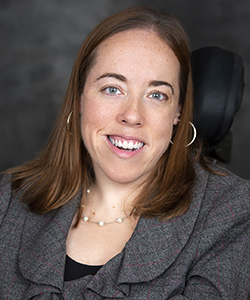Robyn Powell
Assistant Professor of Law
B.S. Bridgewater State University
M.A., Brandeis University
JD, Suffolk University Law School
PhD, Brandeis University
Email: [email protected]
Courses
Professional Responsibility, Disability Law, Public Health Law

Biography
Robyn M. Powell is an Assistant Professor of Law at Stetson University College of Law.
Robyn M. Powell is an Assistant Professor of Law at Stetson University College of Law. Her research explores the intersections of disability law, reproductive justice, family regulation, public health law, and constitutional law. Grounded in disability justice, her work interrogates how legal and policy systems shape the lives of disabled people, often by reinforcing exclusion, inequality, and surveillance through ostensibly neutral frameworks.
Dr. Powell’s legal scholarship has been published in many of the nation’s top law reviews, including the University of Pennsylvania Law Review, California Law Review, Georgetown Law Journal, UC Davis Law Review, UCLA Law Review, Michigan Law Review, and Washington University Law Review, among others. Her work has shaped scholarly conversations around reproductive rights in the post-Dobbs era, the treatment of disabled parents in the child welfare system, and the structural role of law in reinforcing ableism across legal institutions.
An interdisciplinary scholar, Dr. Powell also publishes widely in peer-reviewed journals in public health, disability studies, and social science. Her research appears in outlets such as the American Journal on Intellectual and Developmental Disabilities, Disability and Health Journal, Disability & Society, Social Work Research, and Clinical Ethics. Her work contributes to national efforts to reimagine law and policy through a disability justice lens and is frequently cited in academic, policy, and advocacy settings.
Dr. Powell is one of the nation’s foremost authorities on the rights of parents with disabilities. She is the principal author of Rocking the Cradle: Ensuring the Rights of Parents with Disabilities and Their Children, a groundbreaking report issued by the National Council on Disability. She has written and presented extensively on the rights, needs, and lived experiences of disabled parents, and her expertise has been featured in national and international media, including NPR, BBC, ABC News, the Daily Beast, and the Associated Press. In 2016, she was an invited speaker at the White House Forum on the Civil Rights of Parents with Disabilities.
Before entering academia, Dr. Powell served nearly five years as an Attorney-Advisor at the National Council on Disability, where she advised the President and Congress on disability policy. She previously held roles as Disability Rights Program Manager at the Equal Rights Center, Assistant Director for Policy and Advocacy at the Disability Policy Consortium, and Staff Attorney at Greater Boston Legal Services. She began her legal career through internships at the Disability Law Center—the Massachusetts Protection & Advocacy agency—and the National Council on Disability while in law school.
At Stetson, Dr. Powell teaches Disability Law, Professional Responsibility, Torts, and Public Health Law. She previously held faculty appointments at the University of Oklahoma College of Law and Boston University School of Law. She earned her J.D. from Suffolk University Law School and her Ph.D. in Social Policy from Brandeis University. Her scholarship is deeply informed by her lived experience as a disabled woman and is committed to advancing justice through critical legal inquiry and transformative reform.
Featured Publications
Disabled and Disenfrancised: The Fight for Reproductive Freedom and Democracy Post-Dobbs
Disabling Abortion Bans
In the aftermath of the Supreme Court’s decision in Dobbs v. Jackson Women’s Health Organization, states have rushed to enact restrictive abortion bans, often with vague and narrow health exceptions that disproportionately endanger the lives and well-being of people with disabilities.